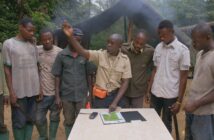This blog was written by JGI Global Chair, Patrick van Veen on behalf of JGI Global Chapters
2020 is a special year for the Jane Goodall Institute because it marks 60 years of science, learning and conservation at Gombe Stream National Park in Tanzania, where Jane Goodall started her ground-breaking research into chimpanzees. What was discovered at Gombe has brought us so much closer to knowing and understanding our closest cousins, the chimpanzees, and thereby so much more about ourselves.
Jane Goodall’s remarkable work over the years has gone beyond scientific discovery into conservation and activism and her work as a UN Messenger of Peace has helped connect us more firmly with nature and with each other. Globally the Jane Goodall Institute’s Roots & Shoots programme for youth leadership has grown to involve thousands of young people in countries all over the world.
These days we are able to connect through technology in ways that were perhaps unimaginable 60 years ago. The Roots & Shoots ForeverWild campaign connects young people around the wild through social media to promote the conservation of endangered animals and raise awareness of threats from wildlife trafficking. This is a wonderful example of how we can harness technology to protect wildlife.
But sadly, as we see wild chimpanzees, great apes and many other animals, endangered by wildlife trafficking, we’re realising that some of the opportunities for sharing and connecting on social media can have a downside for conservation too. We now know that certain types of imagery that may seem harmless and cute to many people can lead to misunderstandings about chimpanzees (and indeed orangutans, slow lorises and other great apes and primates). These images mislead those who see them into thinking chimpanzees could be safe, happy or healthy as pets, or posing and performing, in close proximity with humans. Absolutely not! Great apes are intelligent and social; they have their own special needs which can’t be met in these circumstances. It isn’t safe for anyone to interact with these wild animals. The only people who should do so are professionals such as carers in respected sanctuaries.
The images we see portray neglect and suffering, not to mention the poaching and deadly wildlife trade that brought them to captivity. To meet demand, wildlife traffickers organise supply of illegally hunted live infants, with adults often killed for the bushmeat trade. Such hunts have typically killed up to 10 chimpanzees for every one live infant that is trafficked, including the infant’s mother. Desperately missing their mothers, young infants will cling to anyone who provides care. Doesn’t it seem less cute when you know about that?
We want to ensure we no longer see characterisations of chimpanzees in the media as pets, dressed as humans, posing or performing for entertainment, which we know leads to such suffering for the individuals and threatens wild populations. We hope we can count on your support in our endeavours.
The illegal wildlife trade for bushmeat and the pet industry is not only a critical threat to our closest living relatives, it is also the source of huge risks for human health at the local and global levels. The awareness and close collaboration of local people, authorities and consumers is fundamental to stop this crisis of unprecedented scale before it is too late for all. You can help stop this trade too.
We see some of the suffering caused by trafficking when rescued chimps and other animals arrive at the Jane Goodall Institute’s sanctuaries in Africa. JGI cares for more than 170 rescued chimpanzees in two sanctuaries. We are dedicated not only to rehabilitating rescued individuals, helping them to be healthy chimpanzees and live a happier, more natural life, but also to working with other sanctuaries, promoting the best possible care, and working with communities and authorities to stop poaching and trafficking.
Through our 2020 ForeverWild campaign the Jane Goodall Institute is sharing the message that we must all take care before we share imagery. We’re reflecting on our own imagery. Our work connects people to chimpanzees and other wildlife in powerful ways, through our research, our community projects and our sanctuaries which care for rescued chimpanzees and other wildlife. We want to showcase our work, to reflect our legacy and engage our audiences fully in our plans for the future, and at the same time we will take care with our own imagery and the impact it could have. We are working to help viewers understand the context in which we share our imagery and we are explaining the issues to the public, so that they can take care with what they share too.
We’re working on this at a time of critical importance for the future of all the great apes – including ourselves. Chimpanzees are a flagship species, with whom we share nearly 99% of our DNA. Let us all make sure we are doing all we can to ensure chimpanzees and all wildlife have a safe future.
What can you do to help?
- Learn more about the trafficking of great apes, what JGI is doing globally and how you can help to keep great apes #4EverWild
- #sharewithcare – take care not to share harmful portrayals of great apes and other wildlife. Do share positive imagery which conveys their true nature and needs
- Report harmful social media content
Learn more about the issue in our blog to learn more about #APEpropriate content and what you can do here.

The Jane Goodall Institute is a global community conservation organization that advances the vision and work of Dr. Jane Goodall. By protecting chimpanzees and inspiring people to conserve the natural world we all share, we improve the lives of people, animals and the environment. Everything is connected—everyone can make a difference.







